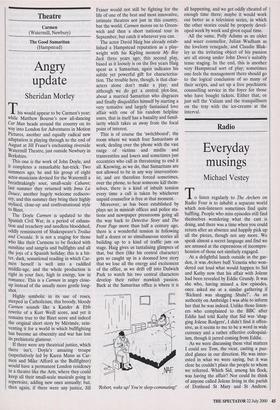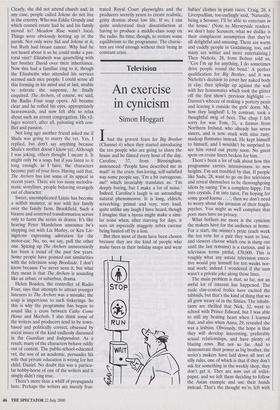Radio
Everyday musings
Michael Vestey
To listen regularly to The Archers on Radio Four is to inhabit a separate world which non-listeners sometimes find quite baffling. People who miss episodes still find themselves wondering what the cast is doing, and there was a time when you could return after an absence and happily pick up all the pieces, though not any more. We speak almost a secret language and find we are amused at the expressions of incompre- hension of those not similarly engaged.
At a delightful lunch outside in the gar- den, it was Archers buff Venetia who won- dered out loud what would happen to Sid and Kathy now that his affair with Jolene had been revealed by Eddie Grundy. It was she who, having missed a few episodes, once asked me at a similar gathering if `Richard was shagging Shula?'. As an authority on Ambridge I was able to inform her that he was indeed. Unlike those listen- ers who complained to the BBC after Eddie had told Kathy that Sid was 'shag- ging Jolene Rodgers', I didn't find it offen- sive, as it seems to me to be a word in wide currency and a rather effective colloquial- ism, though it jarred coming from Eddie.
As we were discussing these vital matters I could see Tom, the vicar, casting a puz- zled glance in our direction. He was inter- ested in what we were saying, but it was clear he couldn't place the people to whom we referred. Which Sid, among his flock, was having the affair? Nor could he think of anyone called Jolene living in the parish of Donhead St Mary and St Andrew. Clearly, she did not attend church and, in any case, people called Jolene do not live in the country. Who was Eddie Grundy and which council estate had he and his family moved to? Meadow Rise wasn't local. Things were obviously hotting up in the parish. Not only were Sid and Jolene at it, but Ruth had breast cancer. Why had he not heard about it so he could make a pas- toral visit? Elizabeth was quarrelling with her brother David over their inheritance. Now this had a familiar ring to it, though the Elizabeths who attended his services seemed such nice people. I could sense all this forming in his mind and at last, unable to tolerate the suspense, he finally enquired. The Archers, of course, we said, the Radio Four soap opera. All became clear and he rolled his eyes, appropriately heavenwards, and now felt able to relax about such an errant congregation. His vil- lages weren't, after all, pulsating with con- flict and passion.
Not long ago another friend asked me if Shula was going to marry the vet. Yes, I replied, but don't say anything because Shula's mother doesn't know yet. Although I was joking, others thought I meant it. It might only be a soap, but if you listen to it long enough, as I have, the characters become part of your lives. Having said that, The Archers has lost some of its appeal in recent years. There are too many melodra- matic storylines, people behaving strangely out of character.
Sweet, uncomplicated Lizzie has become a selfish monster, at war with her family over the family farm, Brookfield. Such a bizarre and contrived transformation serves only to harm the series as drama. It's like hearing Peter Mandelson announce he's stepping out with Liz Hurley, or Ken Liv- ingstone expressing adoration for the motor-car. No, no, we say, pull the other one. Spicing up The Archers unnecessarily has been a trend of the past few years. Some people have pointed out similarities with the television soap Brookside. I don't know because I've never seen it, but what they mean is that The Archers is sounding like an urban, or suburban, drama.
Helen Boaden, the controller of Radio Four, says that attempts to attract younger listeners to The Archers was a mistake; the soap is impervious to such tinkerings. So this is why the programme has begun to sound like a cross between Cathy Come Home and Macbeth. I also think some of the writers and producers tend to be town- based and politically correct, obsessed by social issues of the kind endlessly discussed in the Guardian and Independent. As a result, many of the characters behave oddly out of context. The public-school-educated vet, the son of an academic, persuades his wife that private education is wrong for her child, Daniel. No doubt this was a particu- lar hobby-horse of one of the writers and it simply didn't ring true.
There's more than a whiff of propaganda here. Perhaps the writers are merely frus- trated Royal Court playwrights and the producers secretly yearn to create realistic, gritty dramas about low life. If so, I can quite understand their dissatisfaction at having to produce a middle-class soap on the radio. Its time, though, to restore some equilibrium to the programme. The charac- ters are vivid enough without their being in constant crisis.



























































 Previous page
Previous page